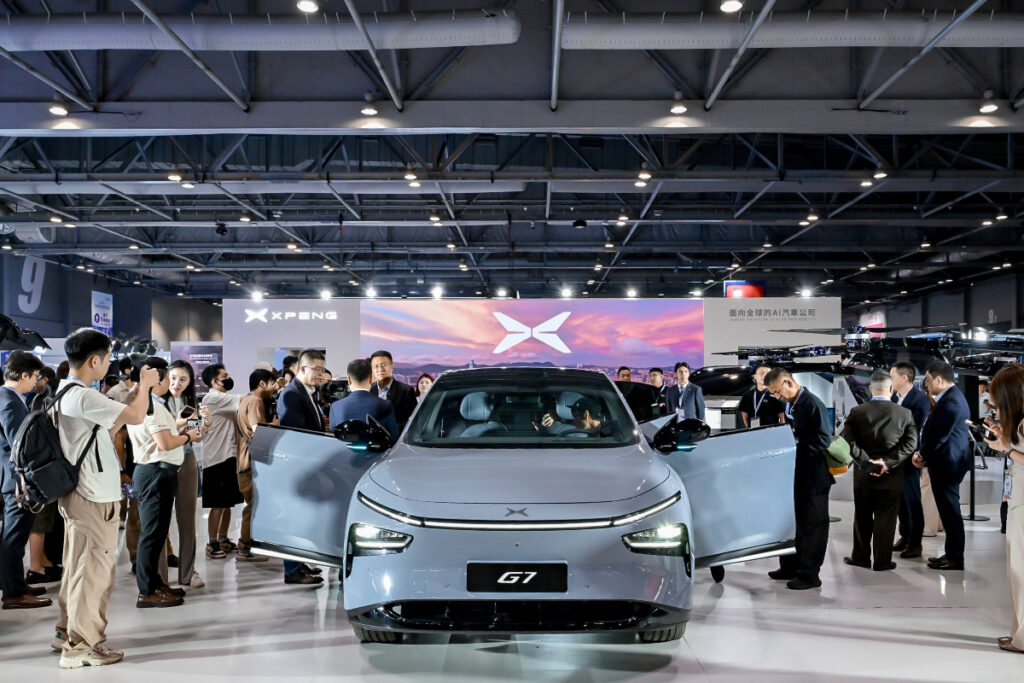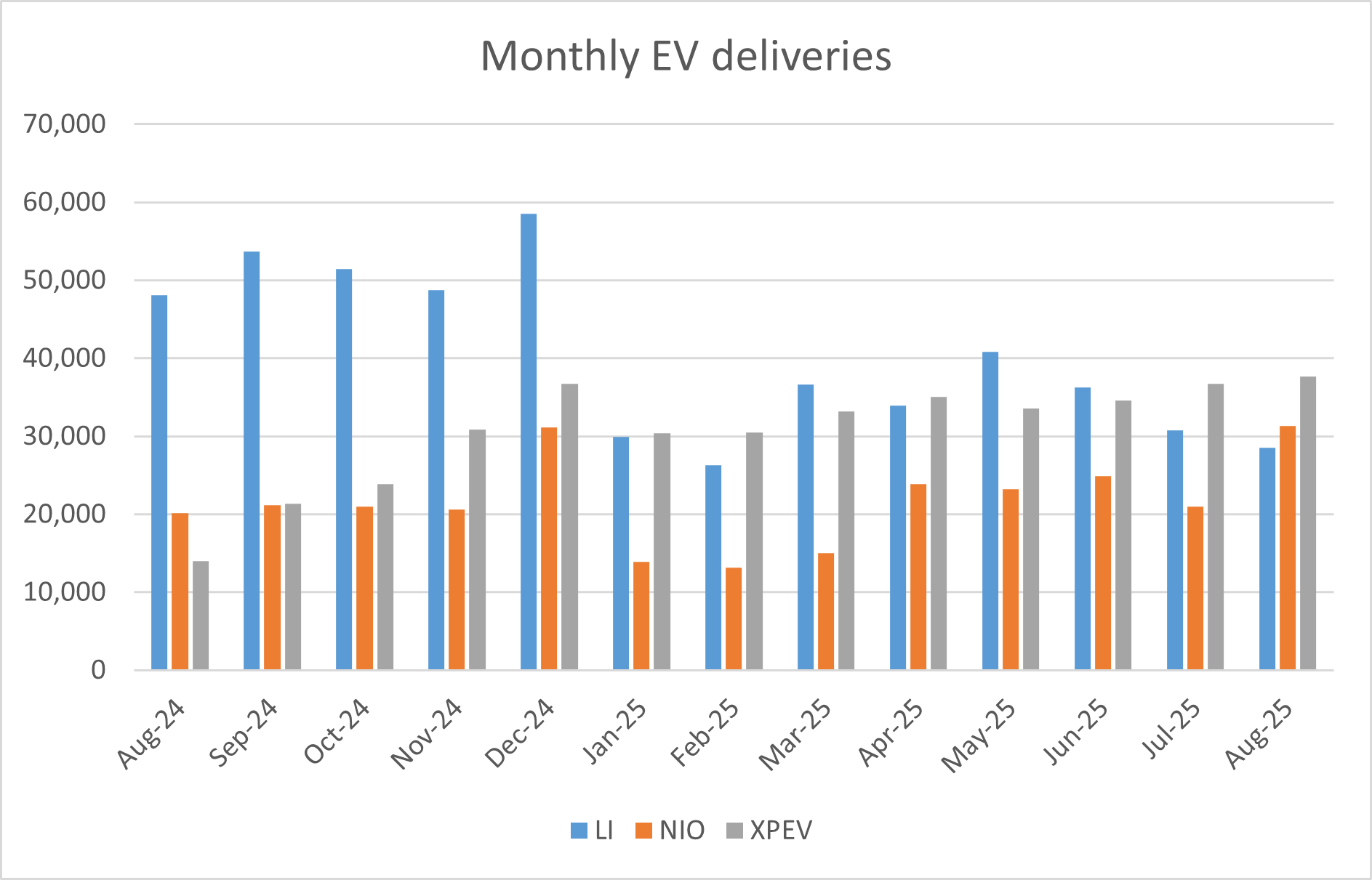
Xpeng Motors (NYSE: XPEV) shares are trading higher in US price action today after the company’s CEO, He Xiaopeng, said that it plans to launch its mass market Mona brand outside the Chinese market in 2026.
Speaking with CNBC, He said, “In 2026 you can expect a variety of Mona products launched into the Chinese and European markets, as well as in rest of the world.”
The Xpeng CEO added, “I believe by then, what we launch will be very proven and very excellent vehicles.”
Xpeng Motors launched the Mona M03 model in China last year, and it has been a major success story, helping propel its deliveries. Riding the success of ist new models, including Mona M03, Xpeng Motors achieved a new monthly record, delivering 37,709 vehicles in August. This represents a staggering 169% year-on-year increase and a 3% rise from the previous month.
In the first eight months of 2025, its electric vehicle (EV) deliveries rose to 271,615, 252% higher than the corresponding period in the previous year. By the end of August, the cumulative deliveries had reached 862,016.

Xpeng Motors plans to expand its presence in 60 countries by the end of 2025, a goal He said the company has already met. Notably, Chinese EV companies have been able to expand globally despite facing tariffs in several countries. Europe is a case in point here, and despite the E.U. tariffs, Chinese EV companies now outsell Tesla, which has been present in that market for much longer and even has a Gigafactory in Germany.
Tesla’s sales have been falling sharply in Europe in recent months as many buyers have shunned Tesla vehicles due to CEO Elon Musk’s political activities, in particular his support for far-right politicians pretty much across the world, including in Europe.
Tesla is facing a backlash in Europe, and 10 drivers in Paris filed a lawsuit against the company, alleging that the perception of its cars becoming political symbols “prevents them from fully enjoying their car.”
Patrick Klugman, one of the lawyers working on the case, told Agence France-Presse, “The situation is both unexpected and impossible for French Tesla owners.” He added, “We believe that Mr Musk owes these buyers the peaceful possession of the thing sold.”
To be sure, even Musk admitted on more than one occasion that his political activities have hurt his businesses. During the Q1 2025 earnings call in April, Musk began his commentary by talking about his stint with President Donald Trump’s Department of Government Efficiency (DOGE) and the “blowback” for that association.
Musk has since left the White House, and his relations with Trump have soured following his outburst against the President’s flagship tax and spending bill. However, it remains to be seen whether Musk’s dissociation from Trump has any impact on the Tesla brand and its reputation among those on the other side of the political divide.
Meanwhile, Xpeng Motors has touted the possibility of acquiring other EV companies, and in the CNBC interview, He said, “I think if we have the opportunity then we want to acquire some companies.” He added, “For us it’s a good thing to do. Manufacturing companies, EV companies are always possible.”
Notably, given the EV industry turmoil, several companies have gone bankrupt. However, many of them have manufacturing assets that can be utilized by other automakers. For instance, Lucid Motors acquired some assets from Nikola that went bankrupt amid burgeoning cash burn.
While Xpeng Motors has managed to bridge its losses, the Chinese EV industry is notorious for the price war that is taking a toll on margins. The price war began in 2022 when Tesla began cutting car prices to spur sales.
Tesla’s price cuts were followed by similar announcements from other carmakers, including Xpeng Motors, Ford, Toyota, and Nissan. In 2023, even NIO lowered car prices. Previously, the company had categorically said that it wouldn’t join the price war.
The China Association of Auto Manufacturers (CAAM) tried to bring about a truce in the price war in 2023, but that effort failed.
The price war escalated in May this year when BYD announced that it would cut prices on 22 of its models until the end of the quarter. The cuts, which were across BEVs and plug-in hybrids (PHEVs), were quite aggressive, and the company slashed the price of its Seagull hatchback by 20%. The model, which is the cheapest from BYD, cost just about 55,800 yuan (around $7,780) after the cut. The biggest cut was for the Seal dual-motor hybrid sedan, whose price was slashed by 34%.
While the price cuts helped BYD buoy deliveries, they took a toll on its profits. For instance, while the company’s Q2 revenues rose 14% year-over-year, its net profits tanked 30%, far worse than expected. Moreover, it was the first time in three years that the company’s profits fell in any quarter.
The Chinese government cracked down on the EV price war again and urged carmakers to ease up on the “involution,” or self-destructive competition, that the price war has created. This has limited BYD’s ability to rely on aggressive discounting, a primary tool in its arsenal. Additionally, regulators have scrutinized other practices, such as subsidy fraud and the practice of briefly registering new cars to boost sales figures
Xpeng Motors is believed to have among the most advanced autonomous driving capabilities among Chinese EV companies. The company’s focus on its XNGP advanced driver-assistance system is gaining traction, achieving an 85% monthly active user penetration rate in urban driving.
In 2023, Volkswagen invested in Xpeng Motors, and as part of the agreement, XPEV will build two EVs on its platform. The deal was a milestone for the Chinese EV ecosystem as it reflected the confidence of Volkswagen in a startup EV company. It was also a testimony to Xpeng Motor’s self-driving capabilities, which the company intends to build upon further. The two companies have since expanded their partnership and, among others, are building a charging network in China.
The post Xpeng Motors shares rise as company eyes global deliveries of Mona brand appeared first on BuyShares.co.uk.
Also read: Strategy rachète 1 955 Bitcoins alors que le marché hésite